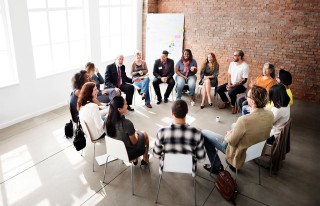News
Welcome to our news section. Our latest news will appear here.
Restorative Practice - trying something different

When we look at restorative practice in Scotland, we find that awareness of the term and access to a restorative service is patchy. This is also true of restorative justice services - in the Scottish Sentencing and Penal Policy Commission report published earlier this month access was described as “fragmented and not universally available”.
In recent years, some progress has been made in developing pilots and best practice, and yet there are still many people who are unfamiliar with the term ‘restorative practice’, let alone knowledgeable about what is involved. Perhaps it may be useful to provide some terminology here:
1) in its most simplest form, restorative practice is a technique for assisting one party to help repair the harm they caused to the other party.
2) restorative justice is restorative practice within the criminal justice system - i.e. where a criminal offence has or has allegedly taken place.
Housing Associations to offer mediation to resolve conflict between residents

Four Ayrshire based Housing Associations have commissioned Sacro’s Scottish
Community Mediation Centre (SCMC), to provide mediation training to staff to enable
them to better resolve conflict among residents. Between them, Cunninghame Housing
Association, Shire Housing, Riverside Scotland and Atrium Homes provide over 7,000
homes in the Ayrshires.
Spotlight on conflict resolution
Spotlight on: Mediation and conflict workshop
I was recently speaking with someone who is about to join us on our mediation training course, and they reflected that – having read the course materials – they realised that mediators don’t make suggestions. This reminded me how little is known about mediation and how at times even when people think they know what mediation is, they can be misinformed.
Community mediation in Scotland began in 1995, with the first service launched in Edinburgh. For over 30 years mediation has been used across Scotland to help neighbours sort out conflicts and to help them develop their own skills in dealing with conflicts more constructively. Our own training has been around for over 25 years now, so why the lack of knowledge and understanding?
New training launched for 2026
New training calendar launched for 2026
We are pleased to announce the launch of our training calendar. For 2026 we have some exciting new workshops to offer, plus our popular and well-respected courses in mediation, conflict resolution and restorative skills. Below are a few highlights.
Mediation ‘taster’ workshop (1.25 hours)
Heard of mediation but not sure what it means? This short workshop explores some of the principles of mediation and outlines the process.
Mediation practice workshops (half day)
For those who have passed our accredited Mediation Skills course, this workshop provides further opportunities for practising skills in a safe and fun environment.
Mediate 2024 Conference: A reflection

With just a week to go before Scottish Mediation’s conference in 2025, and with it being in the middle of the conference season, my thoughts turn back to last year’s mediation conference which was held at the V&A Museum in Dundee. Looking back at my notes and reflecting on the day, some of my thoughts echo something that I have written about in an earlier blog. These are that we are so focused on delivering and developing services, supporting clients and thinking of new ways to help the people that we support, that we rarely take the opportunity to look around at the wider landscape, let alone trumpet our successes from the rooftops.
In looking at the wider landscape and hearing from others in the field, I am reminded of how, at the 2024 conference, we heard from the President of the Mediation Institute of Ireland. The President talked about how mediation has grown over the years in Ireland. We learnt that in recent years mediation has become embedded in some key pieces of legislation. We heard how a key step-change was the Law Reform Commission Report on alternatives to dispute resolution in 2010, which helped begin to shift thinking and set out mediation as an inexpensive and relatively quick way to sort disputes. Since 2010 mediation has become a word that is heard more frequently in Ireland, in international as well as local conflicts. It has a proven track record, with – in one area of mediation - some 70% of cases successfully resolved.

